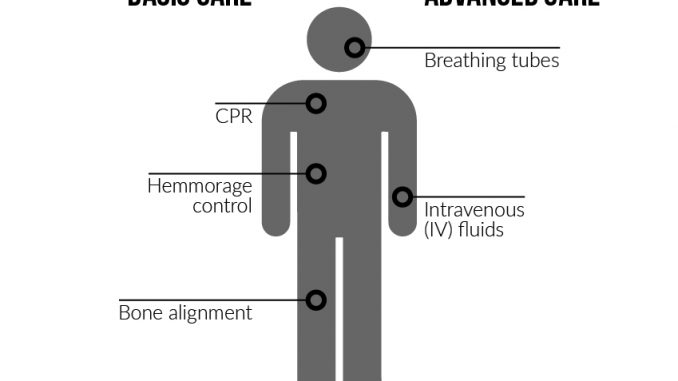
Temple University Hospital delayed a study that would test treatment styles on victims of life-threatening gunshot and stab wounds. The hospital is trying to determine if advanced versus basic treatments will increase survival rates.
The Philadelphia Immediate Transport for Penetrating Injuries Trial, which was originally scheduled to start in Spring 2016, has been put on pause by TUH with concerns for strict Food and Drug Administration procedures. Researchers delayed the study to ensure people both know about and understand the study before it begins.
Doctors at TUH, who are heading the citywide study, said they believe basic care, which focuses on stabilizing the patient before getting to the hospital, is more effective than advanced care, which is used for patients that have to travel farther to get to the hospital.
Philadelphia had 236 gun-related homicides in 2015, and the results of the study could help first responders determine the best treatment for shooting and stabbing victims.
The Study
Every trauma center in the city will participate in the study, which will take five years. Randomly selected victims will receive either basic emergency treatment, which includes CPR, applying tourniquets and other methods to stabilize the victim, or advanced care, which includes administering intravenous fluids and a breathing tube. Only adults shot or stabbed in the torso or upper arms and legs will be included in the study.

PIPT is an exception to standard informed consent procedures, which requires subjects to consent before they participate in a study. Since patients with penetrating injuries cannot consent while they are gravely injured, the study is required to follow specific instructions from the FDA to ensure that it is completely ethical.
FDA regulations state that the community affected must be consulted and educated. This applies to everyone living in Philadelphia, including students at Temple and residents of the surrounding community.
Communication and Outreach
Ensuring community residents feel they are able to make an informed choice is the challenge with this type of study, said Dr. Kathleen Reeves, the director of the Center for Bioethics, Urban Health and Policy at the Lewis Katz School of Medicine.
“I haven’t heard of it,” said Simone Terrell, 56, who lives on Lehigh Avenue near Broad Street. “But, in this neighborhood, and across all neighborhoods, there are a lot of victims that are shot or stabbed, and whatever you can do to ensure that they live, I’m all for that.”
Jason Wood, 30, who lives on North Sydenham Street near West Susquehanna Avenue, disagreed.
“The power should be in the hands of the people,” he said. “It should be their right to decide [what treatment they get].”
“If I had endless hours in a week, I would personally talk to every single person and explain why this has to be done,” said Dr. Zoe Maher, an assistant professor of surgery at the Lewis Katz School of Medicine and a trauma surgeon at TUH.

There are three parts to the study’s outreach process. The first part was through television and radio ads, Maher said. The second part will be outreach to communities that are more likely to have people in the study, in areas where there is more gun violence.
Maher said TUH administrators will contact high-interest individuals, like community leaders.
“We’re getting together groups of community leaders, pastors and health administrators from across the city to educate them, so they can inform their congregations and community organizations,” Reeves said.
She added that informed residents are being paid to educate their neighbors on the study.
Word of mouth is highly effective, Maher said.
Outreach to Temple students, who could also fall into the study, hasn’t “really been figured out yet,” Reeves said. She added that they will work with Student Affairs to ensure students are informed before the study begins.
“I definitely know they’ve done a lot of campaigns to inform the public as best as they can,” said Kevin Pisciella, a senior public health major and the director of Temple University Emergency Medical Services — which is a quick response and basic life-support certified group on Temple’s Main Campus.
While TUEMS won’t participate in the study, they provide the basic care that shooting and stabbing victims might receive when the study begins.
A Wider Impact
In a similar study by the Perelman School of Medicine at the University of Pennsylvania, severely injured gunshot victims who were transported directly to the hospital by police had a similar chance of survival to those brought by ambulance.
“Patients that have been shot or stabbed, that have low blood pressure, do much better if they are taken immediately to a trauma center,” said Dr. Amy Goldberg, the overall investigator for the study.
Goldberg is also a professor and chair of surgery at the Lewis Katz School of Medicine and surgeon-in-chief for Temple University Health System.
Maher and Goldberg said they anticipate victims that are taken directly to a trauma center by police or are given basic life support by EMS will be 8 percent more likely to survive.
Advanced life support procedures can be detrimental to a victim with penetrating injuries who is bleeding to death, Goldberg said.
She added that the study might change not just the practices in Philadelphia, but nationally.
“We can’t wait because as we wait, people are dying,” Goldberg said.
Kelly Brennan can be reached at kelly.brennan@temple.edu or on Twitter @_kellybrennan.



Be the first to comment